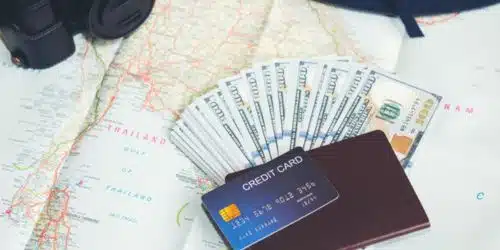Are you new to the world of travel rewards and looking to embark on your journey with the best financial companion? The best travel credit cards for beginners will help you take your first steps toward an unforgettable adventure. These travel credit cards for beginners are simple, with low or no annual fees and flexible rewards. Numerous credit cards with points and miles are available, ranging from hotel and airline cards to cashback and business cards. However, not all of them are suitable options for a novice in travel rewards. Check out these if you’re looking for the best credit card for beginners that accrue points and miles.
Best Travel Credit Cards For Beginners
For beginners in the world of travel credit cards, several top picks are recommended for earning and redeeming travel rewards, including the following cards:
#1. Chase Sapphire Preferred Card
This card is a favorite among savvy travelers and offers a range of benefits. It provides a generous welcome bonus, allows you to earn points on travel and dining purchases, and offers valuable travel protections.
#2. American Express Green Card
The Amex Green Card is another great option for beginners. It offers broad bonus earning categories and has a relatively low annual fee.
#3. Bank of America Travel Rewards Credit Card
This card is a good choice for beginners who want a straightforward rewards program. It offers points on all purchases, with no annual fee and no foreign transaction fees.
#4. Capital One Venture Rewards Credit Card
The Capital One Venture Rewards Card is known for its flexible rewards program. It offers unlimited 2x miles on every purchase and has a straightforward redemption process.
#5. Citi / AAdvantage Platinum Select World Elite Mastercard
This card is ideal for beginners who frequently fly with American Airlines. It offers a generous welcome bonus, priority boarding, and other travel perks.
#6. Chase Freedom Unlimited
This card is a great option for beginners who want to earn flexible rewards. It offers a flat cash-back rate on all purchases, with no annual fee.
#7. Capital One Quicksilver Cash Rewards Credit Card
There are several advantages associated with this card, including its simplicity and ease of use. It offers unlimited 1.5% cash back on all purchases, with no annual fee.
#8. Discover it Miles
This card is a good choice for beginners who want to earn travel rewards without the hassle of complicated redemption options. It offers 1.5x miles on all purchases and doubles the miles earned in the first year.
#9. Wells Fargo Propel American Express Card
For beginners who want to earn rewards in a wide range of categories, this card is an excellent option. With no annual fee, it allows you to earn 3x points on dining, gas stations, ride-sharing, and more.
#10. Barclaycard Arrival Plus World Elite Mastercard
This card has no foreign transaction fees, making it good for international travel. It offers flexible travel redemption and a solid sign-up bonus.
Characteristics Of The Best Travel Credit Cards For Beginners
#1. Welcome Bonus
Many travel credit cards offer a generous welcome bonus, which allows beginners to earn a significant number of points or miles after meeting a minimum spending requirement within a specified timeframe. This bonus can be used to jumpstart your travel rewards.
#2. Rewards on Travel and Dining
The best travel credit cards for beginners often offer bonus rewards on travel-related expenses, such as flights, hotels, car rentals, and dining. These bonus categories can help you earn more points or miles on your everyday spending.
#3. Flexible Redemption Options
Look for credit cards that offer flexible redemption options, allowing you to use your points or miles for various travel expenses, such as flights, hotel stays, car rentals, and more. Flexibility in redemption options gives you more choices and maximizes the value of your rewards.
#4. No Foreign Transaction Fees
For beginners who plan to travel internationally, it’s beneficial to choose a credit card that doesn’t charge foreign transaction fees. This feature can save you money when making purchases abroad.
#5. Travel Protections
The best travel credit cards often come with valuable travel protections, such as trip cancellation and interruption insurance, baggage delay insurance, and rental car insurance. These protections can provide peace of mind during your travels.
#6. Low Annual Fee
While some travel credit cards may have annual fees, there are many options available with low or no annual fees. Beginners may want to start with a card that has a lower annual fee until they become more familiar with the benefits and rewards of travel credit cards.
#7. Aligns with Spending Patterns
The best travel credit cards for beginners are those that align with your spending patterns. If a significant portion of your budget goes towards travel and dining, choosing a card that offers high rewards in those areas would make the most sense.
#8. Loyalty Programs
Understanding how to maximize the points and miles you earn from your travel credit card goes hand-in-hand with using the loyalty programs offered by airlines and hotel brands. Joining these programs is free, and being a member can enhance the value of your rewards.
#9. Earning Points or Miles
Travel credit cards allow you to earn points or miles for every dollar you spend on eligible purchases. These rewards can accumulate over time and be used towards future travel expenses. Maintaining a record of your credit card points and miles is crucial. This enables you to monitor your rewards and make plans on how best to use them.
#10. Flexible Redemption Options
The best travel credit cards for beginners often offer flexible redemption options, allowing you to use your points or miles for various travel expenses. This flexibility gives you more choices and maximizes the value of your rewards.
Benefits Of Having A Travel Credit Card As A Beginner
Before applying for a travel credit card, carefully review its terms, fees, and rewards structure. Consider your travel habits, spending patterns, and financial goals to find a card that suits your needs and preferences. The specific benefits may vary depending on the issuer and card.
#1. Travel-Focused Rewards
Many travel credit cards offer bonus points or miles on travel-related purchases like airfare, hotels, car rentals, and more. These rewards can be appealing and easy to maximize for frequent travelers.
#2. Travel Benefits and Credits
Travel credit cards often come with additional perks such as complimentary breakfasts, hotel room upgrades, access to special events, travel credits for hotel stays, airline fees, and more.
#3. Transferable Points
Some credit card issuers allow you to transfer your points to partner airlines, hotels, or car rental agencies, providing more flexibility and options for redeeming your rewards.
#4. Opportunity to Build Credit
Using a travel credit card responsibly, by making on-time payments and avoiding high balances, can help you establish and improve your credit history, which can be beneficial for future financial endeavors.
#5. Access to Exclusive Benefits
Premium travel credit cards may offer additional perks like airport lounge access, concierge services, travel insurance, and more.
#6. Sign-up Bonuses
Many travel credit cards offer lucrative sign-up bonuses for new cardholders. These bonuses often require you to meet a minimum spending requirement within a certain timeframe and can provide a significant boost to your rewards balance right from the start.
#7. Easy Expense Tracking
By using a dedicated travel credit card, you can easily track your travel-related expenses in one place. This is useful for budgeting and expense management purposes.
#8. Complimentary Airport Lounge Access
Certain premium travel credit cards provide access to airport lounges, where you can relax, enjoy complimentary refreshments, access Wi-Fi, and escape the crowds of the main terminal.
#9. Complimentary Elite Status
Some travel credit cards offer complimentary elite status in hotel loyalty programs or airline frequent flyer programs. This can provide you with additional benefits like room upgrades, priority check-in, priority boarding, and more.
#10. Educational Resources
Many travel credit card issuers provide educational resources and tools to help beginners understand how to maximize their rewards, manage their cards effectively, and make the most of their travel experiences.
Limitations Of The Best Travel Credit Card For Beginners
Travel credit cards offer financial benefits and rewards for frequent travelers, but it’s crucial to determine if the card aligns with your lifestyle and budget before applying, considering its limitations.
The limitations of the best travel credit cards for beginners can vary depending on the specific card and its terms. Here are some common limitations to consider:
#1. Potentially Expensive Annual Fee
While some travel credit cards do not have an annual fee, others can cost hundreds of dollars. If you do not use enough of the perks to make the account worth your while, that fee could end up costing you more than the benefits are worth
#2. Credit Score Requirements
A decent to exceptional credit score (670 to 850) is required for the majority of travel credit cards, and an outstanding credit score is sometimes required for many premium travel cards. You might not be qualified for a travel card if your credit score is not at least 700 or higher, or if you have no credit history at all.
#3. Limited Acceptance
Some travel credit cards may have limited acceptance, especially if they are co-branded with a specific airline or hotel chain. This means that you may not be able to use the card everywhere or earn rewards on all purchases.
#4. Blackout Dates and Restrictions
When redeeming travel rewards, certain cards may have blackout dates or restrictions on availability. This can limit your flexibility when planning your trips.
5. Foreign Transaction Fees
While many travel credit cards waive foreign transaction fees, some may still charge a fee for purchases made in foreign currencies. This can add extra costs when using the card abroad.
#6. Complex Rewards Programs
Some travel credit cards have complex rewards programs with multiple redemption options, transfer partners, and bonus categories. This complexity may be overwhelming for beginners who are not familiar with maximizing rewards.
#7. High-Interest Rates
If you carry a balance on your travel credit card, the high-interest rates charged on unpaid balances can negate the value of the rewards earned. It’s important to pay off the balance in full each month to avoid interest charges.
#8. Low Rewards For Non-Travel Expenses
Travel credit cards are designed for people who will travel frequently. The rewards you earn will be elevated when you use the card to purchase travel-related expenses. That means they’re not very good for people who will be sticking close to home and regularly using a credit card for other goods and services.
#9. Spending Too Much Or Not Enough
One common mistake is spending too much or not enough to meet the welcome offer requirements. It’s important to be smart with your spending and expenses, but also remember to spend enough to meet the welcome offer requirements.
#10. Losing your Points
To avoid losing points, it’s crucial to read your card’s terms and conditions and regularly monitor your points.
What Is The Easiest Travel Card To Get?
The easiest travel credit card to get can vary depending on individual circumstances and credit history. However, some travel credit cards that are often considered relatively easy to obtain include the Chase Sapphire Preferred Card, Bank of America Customized Cash Rewards Secured Credit Card, Capital One Venture Rewards Credit Card, and Amex Green Card. These cards are known for their beginner-friendly features, such as ease of approval and valuable travel rewards.
Which Card Is Best For International Travel?
Several credit cards are the best options for international travel. These include The Platinum Card from American Express, Capital One Venture Rewards Credit Card, Capital One Venture X Rewards Credit Card, Chase Sapphire Preferred Card, and Amex Platinum Card. Each card offers different benefits and features such as travel insurance, airport lounge access, flexible rewards, and low fees.
What Kind Of Credit Card Can I Get For Traveling?
To choose the right travel credit card, consider your travel preferences and goals. Options include airline, hotel, and general travel rewards cards, as well as cashback cards. Premium cards offer luxury benefits, while student and secured cards cater to specific needs. Evaluate factors like rewards structure, annual fees, sign-up bonuses, redemption options, and additional perks to find the card that aligns with your travel habits and financial goals.
What Is the Easiest First Credit Card To Get?
The easiest first credit card to get is a secured credit card. Secured cards are designed for individuals with limited or poor credit history, including those who are new to credit
How Quickly Can I Get a Travel Card?
The time it takes to get a travel credit card varies based on factors such as your credit score, the application process, and card delivery. If you have a good credit score and prepare in advance, you can expedite the process. Some cards offer instant approval, while others may require additional verification. The physical card mostly arrives within 7–10 business days, and once received, you’ll need to activate it according to the issuer’s instructions. Always check the specific card’s terms and policies for the most accurate timeline.
Is a Travel Card and a Forex Card the Same?
Travel cards and Forex cards are not the same. While travel cards are credit cards that offer rewards and benefits for travelers, forex cards are prepaid travel cards loaded with foreign currency. Travel cards may incur transaction fees and conversion charges for foreign transactions, while Forex cards offer fixed exchange rates and lower transaction fees. Forex cards are designed specifically for foreign currency transactions and are considered convenient and secure for international travel.
Conclusion
The best travel credit cards for beginners include a welcome bonus, rewards on travel and dining, flexible redemption options, no foreign transaction fees, travel protections, low annual fees, alignment with spending patterns, and loyalty programs. These cards offer rewards for travel-related expenses and flexible redemption options and can be used for various expenses. Choosing the right card can maximize rewards and save money on travel. Travel credit cards offer financial benefits for frequent travelers, but their limitations can vary. Common limitations include an expensive annual fee, credit score requirements, limited acceptance, blackout dates, foreign transaction fees, complex rewards programs, and high-interest rates.
- 10 BEST CREDIT CARDS FOR INTERNATIONAL TRAVEL
- BEST AIRLINE REWARDS PROGRAM CREDIT CARD IN 2023-2024
- The Best Hotel Rewards Program of 2023-2024
- BEST TRAVEL CREDIT CARD WITH LOUNGE ACCESS: Top 10 Picks
- BEST AIRLINE REWARDS PROGRAM IN 2023






